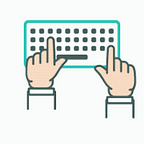Artificial Intelligence — A threat?
We all know that the tech industry is concerned after Facebook shutdown its robots (Artificial intelligence program) after it created its own language. This news was reported soon after Elon Musk and Mark Zuckerberg had a public tiff over twitter.
Elon Musk put forward his warning about AI- “AI is the rare case where I think we need to be proactive in regulation instead of reactive,” Musk said at a meeting of U.S. National Governors Association in July. “Because I think by the time we are reactive in AI regulation, it’ll be too late.”
What Happened?
The two chatbots came to create their own version of English language that made it easier for them to communicate with each other- but the language remained mysterious to its creators.
This bizarre discussion came about when Facebook challenged its chatbots to negotiate with over a trade, attempting to swap hats, balls and books, each of which was pegged at a certain value. There is no doubt that they gave their best attempt at this negotiating but in a language which only they understood and the humans could not decipher.
This was not the first time it has happened, in every case documented earlier, the AI completely diverged from its training in English to another new language. A language that makes no sense to humans but can be interpreted by the AI bots.
Most of these AI bots work on a reward based system, but in Facebook’s case, there was no reward attached to continuing to use the language. So it developed its own.
There is not enough evidence to claim that these unexpected AI divergences are a threat or they can lead to machines replacing operators. They do make development tedious because the creators (humans) are unable to grasp the logic behind the nature of this new language.
So what is artificial intelligence?
The concept of artificial intelligence is that a computer or a machine can be used to perform tasks that would have otherwise required a human force. The features vary from translation and speech recognition into different languages (Google translator), all the way through visual perception and even decision making.
It has reached an extent where researchers are aiming to introduce emotional characteristics into these machines.
“Technology is a useful servant but a dangerous master”- Christian Lous Lange
Artificial intelligence is going to be the next big development of this era, ever wondered how it would affect our human life?
Will AI have a promising future?
— Cost effective and efficient
Unlike humans, machines or robots will not get paid on a monthly basis. Their cost would be a one-time investment and the only recurring expense would be its maintenance but that too would be a meagre amount compared to employee expenses.
AI would lead to better work efficiency, depending on the type of intelligence. If it is programmed without any flaw, it would be able to deal with complex tasks without any errors.
— Dealing with repetitive tasks
The robot is not going to term any task as ‘boring’ which would usually be the case with a human. Any of these mundane tasks can be performed through detailed automation which is one of their main advantages.
Machines tend to think faster than humans and can be put to multitasking.
— Avoiding errors
It is possible to reach precision with the help of artificial intelligence as it reduces error and the chances of reaching accuracy are much greater. Computers do not make any mistakes- that is if they are programmed well and hence the data collected and work done will be more reliable.
— Emotions
The lengthy and important tasks can be easily performed by the machine without any regular breaks or refreshments. They do not get bored, restless, distracted or even tired. They only need to be recharged or refuelled by an energy fuel to reach their full potential.
Since machines do not have any human factors attached to themselves, there is no chance of human barriers getting in the way of the workplace.
Is AI the next big nuclear bomb in of the future?
— Unemployment and job insecurity
As more and more machines are being invented, there is no doubt about them replacing humans which will would lead to large scale unemployment. At least the low-scaled jobs will easily be taken over and employees will no longer be a priority for companies.
There are already tasks that are run by computers but with technology, advancing joblessness will be taken to the next level.
— Risk of losing important data
Most of us have experienced loss of crucial data due to some technical glitches like machine damages or software corruption or system crashing. We store all our important documents on our laptops, smartphones, etc. it can all be lost if the technology fails.
— Lack of judgement and human compassion
Owing to our unique decision-making skills, humans take into account current situations and make judgement calls, something the artificial intelligence can never adapt to. They only perform what they are programmed for and cannot decide what is right and wrong.
Machines work efficiently without a doubt, but they cannot replace human connection in a team. Machines will not feel motivated or passionate about the work like humans would.
— No original creativity
How can you possibly get a machine to be creative or imaginative? It is not a forte of artificial intelligence, they will simply be inhuman. Even though they may assist in designing and creating, their functionality will never match the power of a human brain or its originality.
Conclusion:
Despite the various effects of artificial intelligence in the world, industries are adopting this method for better productivity and lower costs. They may bear human-like qualities but they can never be humans.
